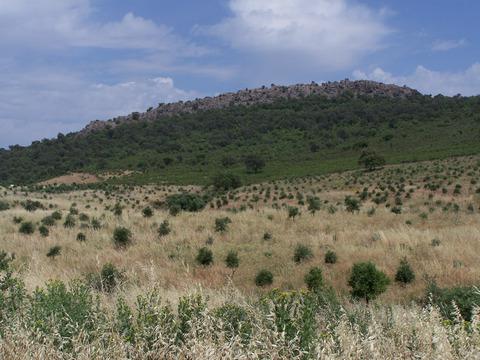Our official English website, www.x-mol.net, welcomes your feedback! (Note: you will need to create a separate account there.)
Adaptation of Mediterranean forest species to climate: Lessons from common garden experiments
Journal of Ecology ( IF 5.5 ) Pub Date : 2021-06-16 , DOI: 10.1111/1365-2745.13730 JA Ramírez‐Valiente 1, 2 , L Santos del Blanco 1, 3 , R Alía 1, 3 , JJ Robledo‐Arnuncio 1, 3 , J Climent 1, 3
中文翻译:

地中海森林物种对气候的适应:常见花园实验的经验教训
更新日期:2021-06-16
Journal of Ecology ( IF 5.5 ) Pub Date : 2021-06-16 , DOI: 10.1111/1365-2745.13730 JA Ramírez‐Valiente 1, 2 , L Santos del Blanco 1, 3 , R Alía 1, 3 , JJ Robledo‐Arnuncio 1, 3 , J Climent 1, 3
Affiliation

|
- Mediterranean ecosystems are biodiversity hotspots located between temperate mesic climates and semi-deserts and deserts. Mediterranean climates are characterized by a drought season but its length and severity can be highly variable across regions. In this review, we explored population genetic variation in functional traits and fitness in Mediterranean oak and pine species. We tested the hypothesis that increased drought tolerance has evolved as an adaptation to xeric and warm areas of the Mediterranean climate while increased competitive abilities have been favoured in more mesic regions, following a productivity-persistence trade-off within species.
- We first reviewed the literature and performed a meta-analysis of studies on Pinus sp. and Quercus sp. from Mediterranean climates, and then analysed a set of unpublished data from Spanish common garden experiments of species from the Mediterranean Basin, searching for evidence of trait genetic variation among populations, local adaptation and trait–environment associations.
- The meta-analysis showed that 82.9% (95% CI 75.7–89.4) of traits per study showed significant population genetic differentiation and that 52.5% (35.6–69.2) of traits in studies with two or more Mediterranean environments exhibited population-by-environment interaction. Population differences in traits related to drought tolerance, cold hardiness and fitness were usually correlated with provenance precipitation and temperature gradients, suggesting that adaptation to different climatic regimes is an important process driving intraspecific genetic divergence. Within the Spanish trial network, however, predicted fitness functions based on climatic transfer distance failed to reveal significantly higher fitness of populations at experimental sites with climates closer to their provenances’ ones. Neither the literature review nor the new analyses of the Spanish trial network provided evidence of a negative association between growth- and persistence-related traits at the intraspecific level.
- Synthesis. Population genetic differentiation in functional traits and fitness is common in Mediterranean species, driven, at least in part, by the adaptation to contrasting temperature and precipitation regimes. Because of experimental constraints or biological reality, our study failed to detect a trade-off between resource-use strategies within species, calling for future studies to investigate further whether intraspecific evolution of stress tolerance occurs at the expense of growth potential in Mediterranean environments or not.
中文翻译:

地中海森林物种对气候的适应:常见花园实验的经验教训
- 地中海生态系统是位于温带中性气候和半沙漠和沙漠之间的生物多样性热点。地中海气候的特点是干旱季节,但其长度和严重程度可能因地区而异。在这篇综述中,我们探讨了地中海橡树和松树物种功能性状和适应性的种群遗传变异。我们检验了这样一个假设,即增加的耐旱性已经进化为对地中海气候干旱和温暖地区的适应,而在物种内生产力-持久性权衡之后,在更多的干旱地区,竞争能力的提高受到了青睐。
- 我们首先回顾了文献并对Pinus sp的研究进行了荟萃分析。和Quercus sp。来自地中海气候,然后分析了一组来自地中海盆地物种的西班牙普通花园实验的未发表数据,寻找种群间性状遗传变异、当地适应和性状-环境关联的证据。
- 荟萃分析显示,每项研究中 82.9% (95% CI 75.7–89.4) 的性状显示出显着的种群遗传分化,而在两个或多个地中海环境的研究中,52.5% (35.6–69.2) 的性状显示出逐个环境的种群相互作用。与耐旱性、耐寒性和适应性相关的种群差异通常与种源降水和温度梯度相关,这表明适应不同气候状况是驱动种内遗传分化的重要过程。然而,在西班牙试验网络中,基于气候转移距离的预测适应度函数未能揭示气候更接近其起源的实验地点的人口适应度显着提高。
- 合成。功能性状和适应性的种群遗传分化在地中海物种中很常见,至少部分是由对不同温度和降水状况的适应驱动的。由于实验限制或生物学现实,我们的研究未能发现物种内资源利用策略之间的权衡,呼吁未来的研究进一步调查是否会以牺牲地中海环境中的生长潜力为代价进行种内胁迫耐受性进化.



























 京公网安备 11010802027423号
京公网安备 11010802027423号